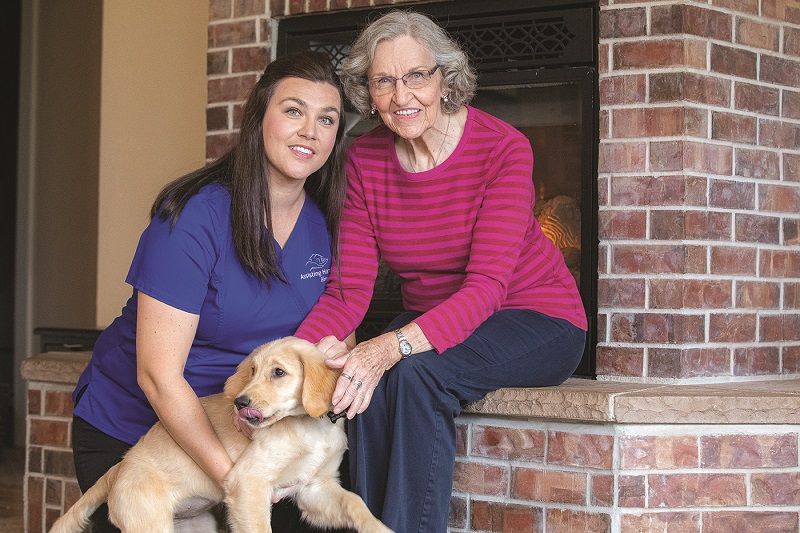
The New Year marks an opportunity for a fresh start, and for caregivers, it’s the perfect time to set meaningful resolutions that support both personal and professional growth. January 1 offers a chance to reassess goals, expectations, and mindset, paving the way for a more balanced year ahead. It’s a moment to reflect on the challenges of the past year, celebrate achievements, and identify areas for improvement—not just as a caregiver, but as an individual.
Prioritize Self-Care with New Year’s Resolutions
One essential resolution for every caregiver should be prioritizing self-care. Caring for others is incredibly rewarding but can often lead to burnout if emotional and physical well-being are neglected. Taking steps to recharge and focus on personal health can make a world of difference. Self-care doesn’t have to be overwhelming; even small, consistent efforts like setting aside 10 minutes a day for relaxation or exercising regularly can have a profound impact. Emotional and physical well-being are the foundation for providing effective, compassionate care.
Additionally, caregivers may choose to set other practical goals, such as improving communication with family members, learning stress-management techniques, or carving out more time for hobbies and activities they enjoy. Even committing to one small, achievable goal and following through can make a significant difference. By taking care of themselves, caregivers can approach the year with renewed energy, patience, and resilience—qualities that are essential for both their loved ones and their personal journey.
The following are New Year’s resolutions that those who provide care can consider.
1. Accept Imperfection
The first resolution caregivers will find helpful is to give themselves permission to fail at keeping a particular resolution. Imperfection is the norm in both everyday life and caregiving. The unexpected can easily occur, so caregivers should not feel upset when expectations fail to go as planned.
In fact, studies have shown that only 3 in 10 Americans made a New Year’s resolution for 2024. Of those who make resolutions, 23% give up on their resolutions after the first week of January and 43% quit their resolution by the end of January. Only about 9% of those who make resolutions keep working on them throughout the year.
A lack of willpower is cited as the most common reason that people do not commit to their New Year’s resolutions. Setting unrealistic goals is another contributor. People may try to make a major adjustment or attempt to make a big change all at once which makes it more difficult to stick to the resolution.
2. Set Attainable Goals
Caregivers often resolve to drastically change their eating habits, aiming to adopt healthier meals free of excess sugar and fats. Yet, after indulging in holiday feasts just the day before, such ambitious New Year’s resolutions are likely to fail.
A more effective approach is to set smaller, realistic goals. For instance, when striving for healthier eating, focus on gradual changes rather than attempting an overnight transformation. Taking small, intentional steps allows for sustainable progress and increases the likelihood of long-term success. Stay strategic and patient throughout the journey.
3. Find Personal Time
A meaningful New Year’s resolution for caregivers is carving out time and space to be alone. While this may seem daunting amidst the demands of caregiving, it is achievable with the right support. The key lies in asking for and accepting help with caregiving responsibilities.
Family members and neighbors can offer invaluable support, allowing caregivers to take much-needed personal time. A sibling who lives nearby might be able to spend weekends with the care recipient, while a helpful neighbor could step in for a few hours during the week.
Another excellent resource for caregivers is home care services. Many agencies offer respite care, a reliable form of short-term or intermittent assistance. Professional caregivers can take over for an afternoon, a weekend, or even longer, giving caregivers the chance to recharge and focus on their well-being.
4. Spend Time with Loved Ones
Another healthy resolution for caregivers is prioritizing time with family and friends. While this may reduce the time and attention dedicated to the care recipient, it is a necessary balance. Staying socially connected fosters emotional well-being and supports overall mental health, ultimately benefiting both the caregiver and those they care for.
5. Don’t Fear Saying No
Setting boundaries and saying no to additional requests is a valuable New Year’s resolution for caregivers. Declining tasks that would add to an already demanding workload helps prevent the stress and overwhelming feeling that comes from taking on more responsibilities than time allows.
6. Be Proactive About Health
Prioritizing personal health is vital and should be a key focus in any caregiver’s New Year’s resolutions. Scheduling and attending regular physical exams, health screenings, dental cleanings, and eye checkups are essential steps to staying healthy.
Equally important is monitoring energy levels and practicing self-awareness to prevent burnout. Stress, exhaustion, and frustration can negatively impact the quality of care provided to a senior loved one. To stay refreshed, consider hiring occasional respite care to take much-needed breaks.
Self-care can also mean indulging in activities that nurture the mind and body. A relaxing massage, aromatherapy, or even simple daily practices like meditation and exercise can go a long way in maintaining physical and emotional well-being. Joining caregiver support groups or participating in online forums can foster a sense of community and alleviate feelings of isolation.
By prioritizing self-care, caregivers can ensure they remain healthy, energized, and capable of providing the best possible care.
7. Let Go of Things Beyond Your Control
As a caregiver, it is natural to want to resolve every issue experienced by those in your care. However, there are times when problems arise that are simply beyond your control.
It is important to understand and accept that you cannot always prevent certain problems from occurring, nor can you resolve every issue you encounter. While you can do your best to help resolve problems as they happen, you must accept that certain issues may be beyond your ability to resolve without outside help. It also helps to spend less time worrying about the potential for issues that you may not be able to prevent.
8. Focus on What You Do Well as a Caregiver
Caregivers often dedicate themselves to providing the best possible care, yet it’s common to dwell on perceived flaws or imperfections. Many focus on what they feel they’re not doing well, judging themselves harshly and questioning the quality of their care. However, self-criticism rarely leads to better caregiving.
Instead of fixating on your perceived shortcomings, shift your attention to the strengths you bring to caregiving. Every caregiver has unique skills and qualities they excel at. By recognizing and celebrating what you do well, you not only boost your self-confidence but also reinforce the meaningful impact you have on those in your care. This positive mindset fosters better care and creates a more uplifting experience for both you and the individuals you support.
9. Accept Good Advice
Caregivers perform their responsibilities better when they seek and accept advice from professionals, organizations, and fellow caregivers. Make it a resolution to seek advice from home care professionals, who can evaluate the home for fall risks and make recommendations for improved safety.
Accepting advice from elder care organizations is not a sign of weakness. Rather, the caregiver shows strength when accepting good advice from reputable outside sources. You may, in fact, learn new techniques that enable you to perform your responsibilities better while improving the senior’s comfort and well-being.
Home Care and Respite Care from Assisting Hands

Achieving a balance of productivity and happiness as a caregiver is entirely possible. By setting realistic New Year’s resolutions, like the ones mentioned above, caregivers can bring more joy into their daily lives while reducing the stress that often comes with caregiving. The goal isn’t perfection—it’s maintaining realistic expectations.
One resolution to consider is incorporating quality home care through Assisting Hands Home Care. Our compassionate respite care services allow family caregivers to take a well-deserved break and focus on self-care, knowing their loved ones are receiving exceptional care. Respite care is vital for the health of a family caregiver with benefits that include a lower risk of depression, reduced stress, more rest, and renewed energy to provide better quality care.
If you provide care for your senior loved ones, you can avoid burnout this new year and ensure your loved ones get the best possible care by working with Assisting Hands Home Care in Burr Ridge, IL | Lyons, IL | Indian Head Park, IL | McCook, IL | Hodgkins, IL | Countryside, IL | Willow Springs, IL | Palisades, IL | La Grange Highlands, IL | Clarendon Hills, IL | Brookfield, IL | Western Springs, IL | Hinsdale, IL | Darien, IL | La Grange, IL | Downers Grove, IL | Oak Brook, IL | Willowbrook, IL. Give us a call (630) 407-1932 to learn more.















